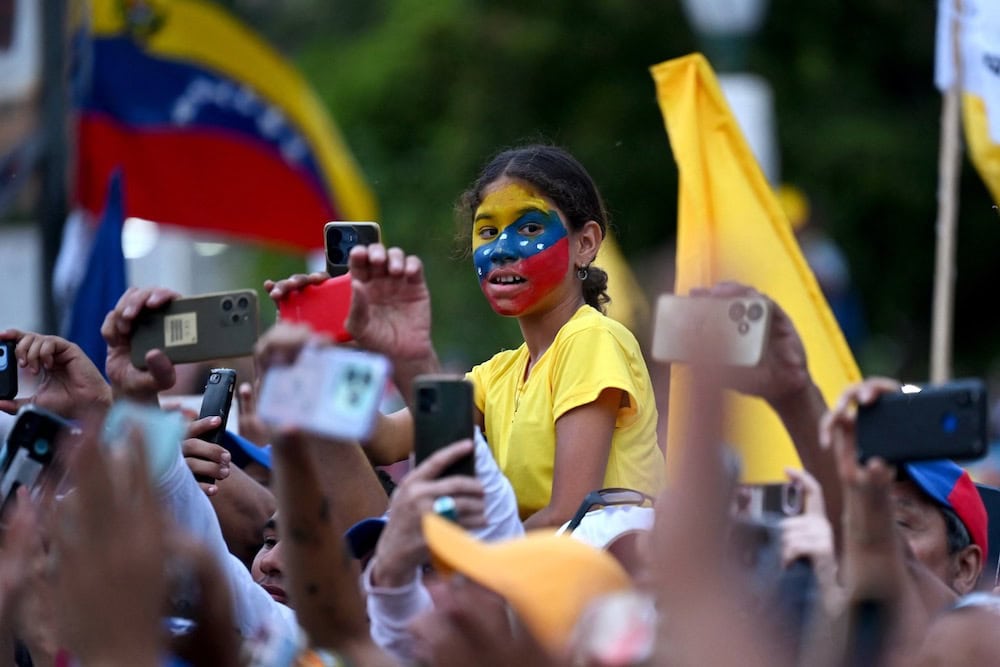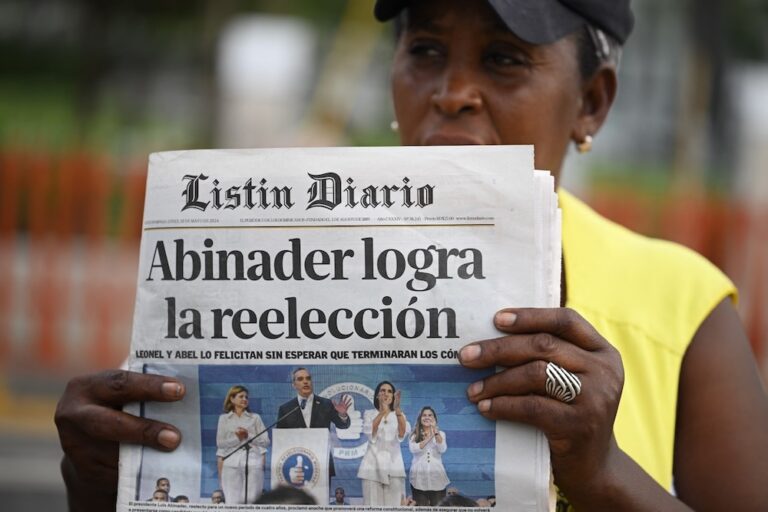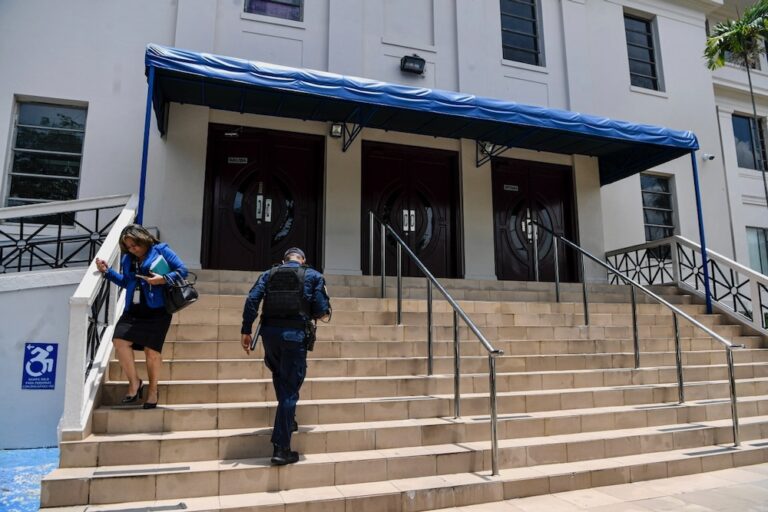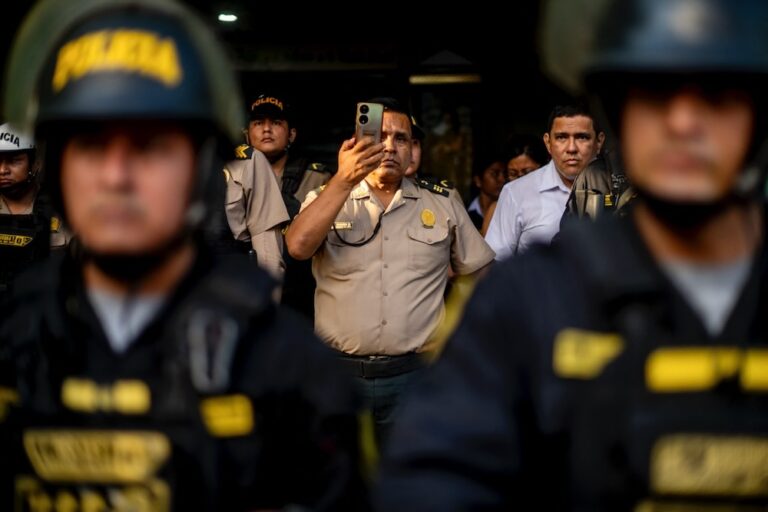July in the Americas: A free expression and civic space round-up produced by IFEX's Regional Editor Laura Vidal, based on IFEX member reports and news from the region.
In July, civil society in the region faced increasing threats, making more evident the authoritarian tendencies that have been challenging their work in the last period. Also, Venezuela’s elections were overshadowed by media censorship and repression, raising serious concerns about democratic integrity. Meanwhile, Canada’s Bill C-63 sparks debate over balancing online safety with free speech, reflecting broader global challenges to digital rights and freedoms.
Civil society under pressure across the region
The rise of authoritarianism across the region manifests in various forms, such as legal harassment (SLAPPs), restrictive legislation, and public stigmatisation by high-ranking officials. In July, numerous cases emerged, with several civil society organisations (CSOs), including IFEX members, facing attacks for defending freedom of expression.
A comprehensive analysis would require much more space to represent the numerous initiatives aiming to close civic space; however, July saw many efforts crystallise in this regard.
Colombian President Petro escalated his conflict with the press by attacking IFEX member the Foundation for Press Freedom (FLIP), which had criticised him for stigmatising journalists and undermining journalistic credibility. The Foundation faced harsh backlash online from the president’s followers, while, Jonathan Bock, FLIP’s director, criticised the attacks as systematic and dangerous to free expression.
In Argentina, IFEX member FOPEA experienced a smear campaign by government-linked digital operators. Concerns were raised over President Milei’s endorsement of offensive expressions to discredit independent journalism, a hostility from the highest levels of government that many saw as unprecedented, especially considering Milei’s short tenure.
Similar situations have occurred in the past in Mexico, where IFEX member ARTICLE 19 Mexico and Central America faced attacks from the presidency and on social media.
Harassment extends beyond social media, however, through challenges that are far from new in the region and that have altered the legal landscape.
In recent years, in Nicaragua, Ortega’s regime has systematically shut down human rights organisations to obscure government abuses. This case serves as an alarming reference for civil society actors across the region. Venezuela is exploring similar measures; a bill passed in its first reading by the National Assembly in January 2024, reminiscent of Russia’s foreign agent laws, threatens to criminalise CSOs. This bill has prompted discussion and advocacy efforts, including a joint statement led by IFEX-ALC and its members, as well as other regional networks devoted to freedom of expression.
A similar scenario is unfolding in Paraguay, where the Senate, without any public consultation or hearings, approved a bill to control and increase transparency and accountability for non-profit organisations. The bill now awaits consideration by the Chamber of Deputies. If approved, Paraguay’s legislature would endorse highly restrictive conditions for CSOs. During the discussion, members of parliament stigmatised CSOs, accusing them of being subversive and harmful. The Union of Paraguayan Journalists (SPP) expressed concern, noting, “It is even more serious that the attacks were made against journalists and organisations that have published investigations affecting political power, constituting clear retaliation against them.”
In Peru, proposed legislation targets CSOs, accusing them of destabilising the country. On 5 June, with 12 votes in favour and only one against, the Foreign Relations Committee of Congress, chaired by Alejandro Aguinaga, approved a preliminary bill to modify legislation on the supervision and oversight of non-governmental organisations (NGOs) in the country. At the time of writing this article, the bill was awaiting final approval.
Critical elections in Venezuela: an end to civic space?
Venezuela’s presidential elections on 28 July resulted in the official declaration of Nicolás Maduro’s victory. However, the opposition, numerous international organisations, and certain regional governments have questioned the legitimacy of the results, calling for a thorough review. The elections were marred by violations of voter rights, restrictions on freedom of expression, and severe limitations on press freedom.
The stakes are very high for civil society, as civic space risks closing completely under a new Maduro administration. Given the developments of the past years, with the closing of hundreds of radio stations, attacks against the press, constant limitations to internet access and arbitrary detentions of opposition figures and activists, the prospect of another six years raises significant concerns.
Ahead of the elections the media landscape was heavily controlled, with government oversight and self-censorship skewing coverage. Journalists and press freedom groups, including IFEX member the Committee to Protect Journalists (CPJ), noted that TV and radio stations provided extensive coverage of Maduro’s campaign while largely ignoring the opposition. News about opposition candidates like Edmundo González and María Corina Machado was restricted to independent news websites, many of which were blocked, and social media platforms like X, Facebook, Instagram, YouTube, and WhatsApp.
Appearances by opposition politicians in mainstream media have been rare. For example, when González appeared on local TV station Venevisión in April, the focus on social media was more about the channel’s decision to air the interview than the content of his presidential plans. The media landscape was further complicated by incidents of repression, such as the blocking of key news portals like TalCual, El Estímulo, Analítica, and Runrunes, as well as NGO sites Medianálisis and Observatorio de Internet VE Sin Filtro. Local organisation VE Sin Filtro reported that these blockages, initiated by state-owned CANTV and private operators, increased the number of restricted sites since the campaign began.
In the weeks leading up to the elections, there was a noticeable rise in the suspension of radio programs featuring opposition candidates and arbitrary detentions. The NGO Laboratorio de Paz reported an increase in detentions against the opposition, state violence, and the misuse of public platforms for pro-chavista campaigns. At least 76 arbitrary arrests occurred in the two weeks before election day.
Civil society remained vigilant, with organisations like IFEX member Espacio Público conducting live broadcasts to highlight increased censorship and publishing reports on the situation. Despite challenges, efforts were made to ensure information access, including a new app by VE Sin Filtro to help bypass media blockages, particularly for those without access to VPNs.
Canada: Second reading of Bill C-63, the Online Harms Act
Bill C-63 is currently under its second reading in the House of Commons. This legislation, in development since 2021, aims to address online bullying and exploitation, with a focus on protecting children. It mandates social media platforms with significant user bases to remove content related to child sexual or physical abuse, and non-consensual adult material. Additionally, platforms are required to adopt measures to empower users and identify harmful content spread by bots.
However, the bill has drawn criticism for its broader implications. It introduces significant changes to the Criminal Code and Canadian Human Rights Act, including harsh penalties and the controversial introduction of a ‘pre-crime’ status. These measures have raised concerns among civil liberties advocates, who argue that the bill imposes draconian restrictions on free speech.
IFEX member Open Media, along with 20 other organisations, has called for separating the more contentious parts of the bill from its core elements focused on online harm. In an open letter, these groups emphasised that the public discourse has largely overlooked the bill’s original intent to tackle illegal online content and protect young Canadians, overshadowed by debates over the proposed legal changes.
Matt Hatfield, Executive Director of Open Media, stated, “Bill C-63 presents Canadians with a false choice: either we accept extraordinarily draconian punishments for our speech, or we can’t have common-sense online protections. That’s a false dichotomy. That’s why Open Media is asking the government to do the right thing and separate the Online Harms Act itself from its other proposals. Young Canadians and victims of online sexual violence should not be used as pawns to force through profound restrictions on our fundamental rights.”
The bill has sparked a range of political reactions. The New Democratic Party (NDP) supports the bill but advocates for a stronger version, calling for thorough debate in the House of Commons. Meanwhile, conservative parties have labelled it as “Justin Trudeau’s latest attack on freedom of expression,” highlighting the contentious nature of this legislative effort. As the debate continues, over 4,000 Open Media community members have urged their MPs to advocate for splitting the bill to ensure that the protections for young Canadians do not come at the expense of fundamental rights.
In brief
U.N. declares Zamora’s detention arbitrary: The United Nations Working Group on Arbitrary Detention declared the imprisonment of Guatemalan journalist José Rubén Zamora as arbitrary and in violation of international law. CPJ supports an urgent appeal filed on his behalf, citing conditions akin to torture.
Journalists murdered in Mexico: On 28 June, Víctor Alfonso Culebro Morales, director of the news portal Realidades and a Radio Fórmula collaborator, was murdered in Chiapas. Additionally, the body of Víctor Manuel Jiménez Campos, a contributor to Digital Noticias and Rotativa Digital Guanajuato, was discovered this year; the journalist went missing in 2020. ARTICLE 19 Mexico and Central America highlighted the ongoing violence against the press in the country.
Brazil’s Artifical Intelligence regulation bill: Brazil’s Bill 2338/2023, focused on AI regulation, is pending approval. The bill seeks to address the risks and rights associated with AI, aiming to harmonise with international standards and position Brazil as a leader in responsible AI technology. An open letter from various digital rights organisations highlights the bill’s strengths, as well as areas needing improvement.



